Summary of Findings
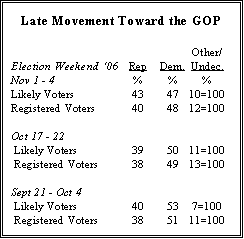
A nationwide Pew Research Center survey finds voting intentions shifting in the direction of Republican congressional candidates in the final days of the 2006 midterm campaign. The new survey finds a growing percentage of likely voters saying they will vote for GOP candidates. However, the Democrats still hold a 48% to 40% lead among registered voters, and a modest lead of 47%-43% among likely voters.
The narrowing of the Democratic lead raises questions about whether the party will win a large enough share of the popular vote to recapture control of the House of Representatives. The relationship between a party’s share of the popular vote and the number of seats it wins is less certain than it once was, in large part because of the increasing prevalence of safe seat redistricting. As a result, forecasting seat gains from national surveys has become more difficult.
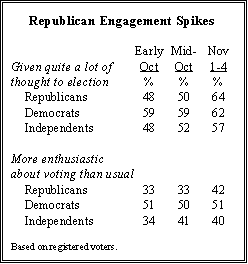
The survey suggests that the judgment of undecided voters will be crucial to the outcome of many congressional races this year. As many as 19% of voters now only lean to a candidate or are flatly undecided. The Democrats hold a 44% to 35% lead among committed voters. But the race is more even among voters who are less strongly committed to a candidate; those who only lean to a candidate divide almost evenly between Republicans and Democrats (5% lean Republican/4% lean Democrat).
Republican gains in the new poll reflect a number of late-breaking trends. First, Republicans have become more engaged and enthused in the election than they had been in September and October. While Democrats continue to express greater enthusiasm about voting than do Republicans, as many Republican voters (64%) as Democratic voters (62%) now say they are giving quite a lot of thought to the election. About a month ago, Democratic voters were considerably more likely than GOP voters to say they were giving a lot of thought to the election (by 59%-50%). As a result, Republicans now register a greater likelihood of voting than do Democrats, as is typical in mid-term elections.
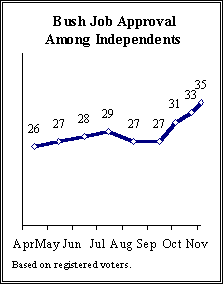
The Republicans also have made major gains, in a relatively short time period, among independent voters. Since early this year, the Democratic advantage in the generic House ballot has been built largely on a solid lead among independents. As recently as mid-October, 47% of independent voters said they were voting for the Democratic candidate in their district, compared with 29% who favored the Republican. Currently, Democrats lead by 44%-33% among independent voters.
Notably, President Bush’s political standing has improved in the final week before the election. Bush’s job approval rating among registered voters has risen from 37% in early October, to 41% in the current survey. Mirroring the GOP’s gains among independent voters, Bush’s rating among this crucial group of swing voters now stands at 35%, its highest point this year.
The final pre-election survey by the Pew Research Center for the People & the Press, conducted among 2,369 registered voters from Nov. 1-4, finds that voter appraisals of the national economy also have improved. In the current poll, 44% rate it as excellent or good, compared with 36% who held that view in mid-October. Republicans and independents have a much better view of the economy than they did just a few weeks ago. Among independent voters, 41% rate the economy as good or excellent, compared with 29% in mid-October.
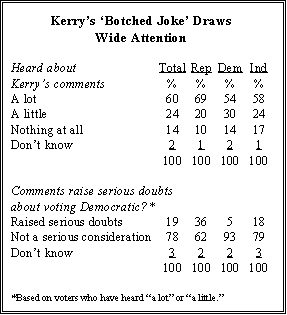
In addition, Sen. John Kerry’s “botched joke” about the war in Iraq attracted enormous attention. Fully 84% of voters say they have heard a lot or a little about Kerry’s remarks with 60% saying they have heard a lot. By comparison, just 26% say they have heard a lot about President Bush’s statement that he will keep Donald Rumsfeld as secretary of defense until he leaves office in 2009. Most voters say Kerry’s statement is not a serious consideration in their vote, but 18% of independent voters say it did raise serious doubts about voting for a Democratic candidate.
GOP Voters More Engaged
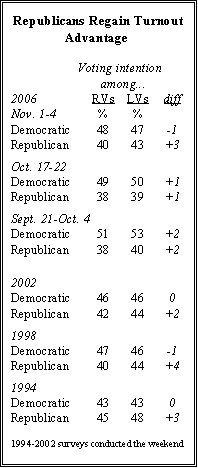
For months, Democrats have expressed more interest in the election and enthusiasm about voting than have Republicans. The ‘enthusiasm gap’ was dramatic in Pew surveys in early October (18 points) and late October (17 points).
These differences have narrowed considerably. About half of Democratic voters (51%) say they are more enthusiastic than usual about voting, little change from Pew’s two previous surveys. By contrast, 42% of Republicans say they are more enthusiastic about voting; that is fewer than the percentage of Democrats more enthused about going to vote, but 10 points higher than just a few weeks ago.
Moreover, Republicans have gained ground in recent weeks on measures aimed at assessing a voter’s likelihood of voting. So while Pew polls in early October and mid-October showed virtually no change in the Democratic advantage between all voters and those most likely to turn out, the current survey shows the Democrats’ eight-point lead among all registered voters narrowing considerably among likely voters. In this regard, the current campaign more closely resembles previous midterm elections since 1994, when Republicans also fared better among likely voters than among all registered voters.
Party Control a Major Factor

While Republicans have become more engaged in the campaign in recent weeks, an increasing number also say that the issue of which party controls Congress will be a factor in their vote. Currently, 65% of Republicans say partisan control of Congress is a factor in their vote, up from 58% in early October and 54% in June. The percentage of Democrats who view partisan control of Congress a factor in their vote has remained more stable; 73% say that, up slightly from early October, but largely unchanged from June.
Compared to past campaigns, many more voters, regardless of party affiliation, say partisan control of Congress matters in their vote. Fully 61% of registered voters now express this view; fewer than half did so in November 2002 (48%) and November 1998 (46%).
Iraq Still Top Issue

The situation in Iraq remains the top issue of the midterm elections. Roughly half of voters (48%) cite the situation in Iraq as either the most important (or second most important) issue in their vote. Roughly four-in-ten (42%) cite the economy as a major issue in their vote, while 35% say health care. These opinions have changed very little over the past month.
The situation in Iraq is by far the top issue for Democrats (60%). About half of independents (46%) cite Iraq as an important issue in their vote, but 41% mention the economy and 36% health care. Among Republicans, comparable percentages view terrorism (41%), the economy (41%), and the situation in Iraq (38%) as the top issue in their vote. Immigration is a much more important issue for Republicans (31%) and independents (26%) than it is for Democrats (15%).
Interest High, But More ‘Mud-Slinging’
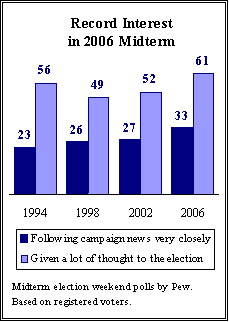
The overall level of voter interest in this campaign is much higher than it has been for recent midterms. Fully 61% of voters say they have given a lot of thought to the election, while 33% say they have followed campaign news very closely. This far surpasses interest in the 2002 and the 1998 campaigns, and even the historic 1994 election, when the Republicans gained control of Congress.

At the same time, more voters feel that this election season has seen more “mud-slinging” than past elections. Overall, 65% of voters 72% of those who live in congressional districts with competitive contests say this campaign has been marred by more negative campaigning than in past elections; only about half of voters expressed this opinion at the end of the 2002 (51%) and 1998 (52%) midterms.
This is one issue on which there is little partisan division. Two-thirds of independents (67%), and nearly as many Democrats (65%) and Republicans (65%), say there has been more negative campaigning than in past elections.
Most Voters Have Been Contacted
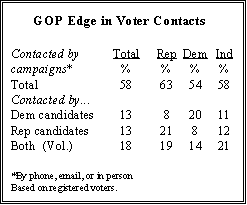
Roughly six-in-ten voters (58%) say they have been contacted by candidates or political groups, either over the phone, in person, or by email. That represents a modest increase from early October (49%). Somewhat more Republicans (63%) than independents (58%) or Democrats (54%) say they have been contacted by campaigns. One-in-five Democrats (20%) say they have been urged to vote for a Democratic candidate. About the same number of Republicans (21%) say they have been urged to vote for one of their party’s candidates; more Republicans than Democrats volunteer that they have been encouraged to vote for both GOP and Democratic candidates (19% vs. 14%).
GOP Gloom Increases

All year, Democrats have been much more bullish than the Republicans regarding their party’s electoral prospects. The gap has widened in the campaign’s final days. Fully 72% of Democratic voters say they think the Democratic Party will do better this year than it has in recent elections, up slightly from last month.
Meanwhile, more Republican voters feel the party will do worse than it has in recent elections (29% now vs. 21% last month). A plurality of GOP voters (48%) say the party will fare about the same as it has in recent elections, while just 17% think the Republican Party will do better than it has in recent years.